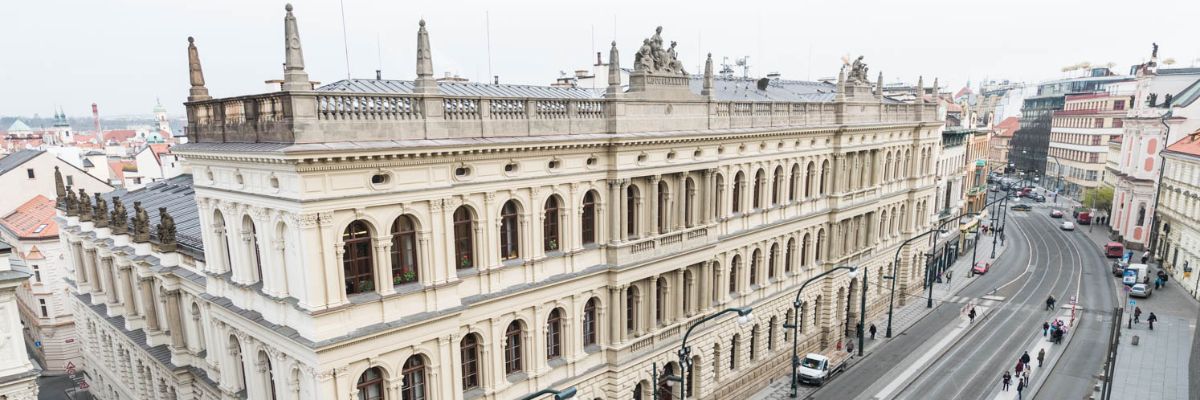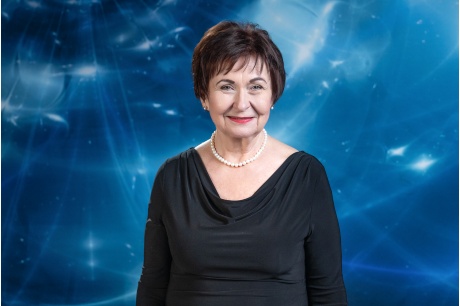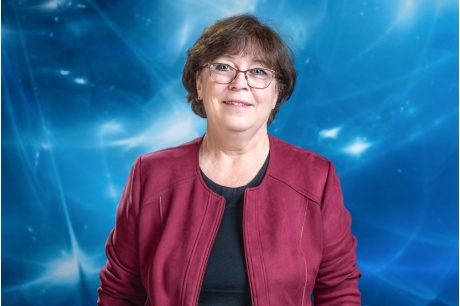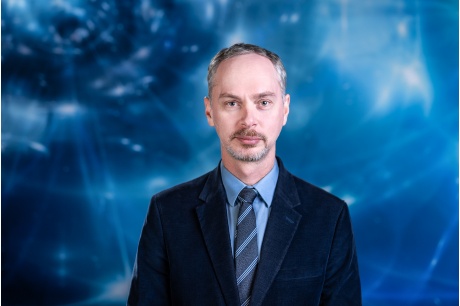
Vice-Presidents of the CAS set priorities for 2025–2029 term
05. 08. 2025
Since April, the trio of vice-presidents of the Czech Academy of Sciences for the 2025–2029 term has comprised Ilona Müllerová, Ondřej Beránek, and Miroslava Anděrová. What are their priorities in the research areas they coordinate? And how do they believe the Academy can enhance its standing and more effectively support early-career researchers?
At its March session this year, the Academy Assembly of the Czech Academy of Sciences (CAS) confirmed the new composition of the Academy Council. In April, its members divided their responsibilities. Ilona Müllerová was re-elected vice-president and will continue, among other things, to coordinate the First Research Area – Mathematics, Physics, and Earth Sciences. Ondřej Beránek also secured a second term and remains responsible for the CAS institutes in the Third Research Area – Humanities and Social Sciences. Miroslava Anděrová was newly appointed as vice-president for the Second Research Area – Life and Chemical Sciences. What are their plans to improve communication between the CAS leadership and its institutes?
ILONA MÜLLEROVÁ

Which initiatives from the previous term would you like to build on?
I was primarily responsible for coordinating the strategic development of the First Research Area – Mathematics, Physics, and Earth Sciences, and for overseeing science policy and organizational matters at the field-relevant CAS institutes. I was also involved in strengthening ties with the commercial sector and promoting knowledge and technology transfer into applied practice. During this period, technology transfer received strong backing from CAS leadership. The Technology Transfer Center – CETAV was further developed, and we launched the PRAK program (Program for the Support of Applied Research and Knowledge Transfer). These efforts have yielded valuable experience and insights into how to further advance transfer activities. We have a strong network of transfer specialists at the individual CAS institutes who work closely with CETAV experts. I would like to continue with all these activities. The conclusions from the evaluation of the CAS institutes for the 2020–2024 period will also serve as a valuable foundation for future development.
How do you plan to further develop knowledge and technology transfer?
We’d like to deepen our collaboration with key stakeholders – primarily the Technology Agency of the Czech Republic, the Ministry of Industry and Trade and the Ministry of Transport of the Czech Republic, along with others that support cooperation with industry or directly promote transfer. To that end, we’ve established the Council for the Support of Innovation and Knowledge Transfer of the CAS, made up of representatives from these institutions. It will serve as an advisory body to the Academy Council, similar to the Collegium for Innovation and Knowledge Transfer, and will include representatives from nearly all CAS institutes. We also plan to focus on intellectual property management and draft a new methodological guideline. Strengthening cooperation with investors is another priority. Moreover, we want to support the professional development of researchers in areas related to transfer and enhance their ability to efficiently communicate scientific results.
How could the Academy more effectively support early-career researchers?
We have a number of funding schemes aimed at supporting young researchers. Financial resources undoubtedly play a key role, but equally important is everyday collaboration and recognition – even of partial results. I firmly believe that in addition to funding, we have to offer them our time. We should help them learn how to present research results effectively, both within academia and in the applied sector.
Where do you see room for improvement in communication between CAS leadership and CAS institutes?
This is a question I ask myself quite often. I would like to improve my communication with the institutes, but at the same time, I don’t want to take up time they need for their already demanding work – which is further complicated at many institutes by the heavy reliance on targeted funding. That said, I do plan to speak with the CAS institute directors and chairpersons of the institute boards about whether and how communication could be improved.
In concrete terms, how should the Academy strengthen its position within the national science policy system?
What I consider absolutely crucial is communication at all levels and a clear explanation of the role of the Academy and its institutes. We must do more to highlight our scientific achievements, which – when compared with those of other major European institutions – are often on par or even better. We should also emphasize our strong ties with universities and applied-sector partners, and actively invite stakeholders to visit our institutes.
*
MIROSLAVA ANDĚROVÁ

What are your priorities as vice-president for the Second Research Area – Life and Chemical Sciences? What would you like to change?
My top priority is to enhance the international competitiveness of our CAS institutes and research teams in the area of Life and Chemical Sciences. This includes support for excellence in research and stronger collaboration between the chemical and biological sciences, which intersect in many innovative fields – such as biotechnology, bioinformatics, and medicinal chemistry. I would also like to improve the internal funding system by directing more support to high-performing teams and promising early-career researchers, and by making it more flexible in responding to emerging research challenges. Another goal is to implement mentoring and additional education programs to ensure that young scientists have ample opportunities for professional growth.
How do you plan to develop knowledge and technology transfer in your research area?
The Second Research Area holds tremendous potential, but also certain gaps – especially in biomedical research. From my perspective, we need to strengthen expert infrastructure – from legal support to application platforms that connect institutes, universities, clinical facilities, biotech companies, and, where relevant, industry players. I’d like to put together a team made up of representatives from biotech firms, research institutes, and clinical facilities to help identify focus areas and outputs for applied research – for instance, in biomedicine, medicinal chemistry, or environmental technologies. I also want to organize events focused on fostering the exchange of experience between researchers and practitioners, such as symposia on translating preclinical findings into clinical practice. I’d like to support the creation of an innovation center focused on biomedicine, one that would combine research with technology transfer. This would help ensure faster translation of research results into clinical applications.
How could the Academy more effectively support early-career researchers?
Without young, talented researchers, institutes of the Czech Academy of Sciences will not remain competitive in the long term. Young scientists need a clear outlook – in other words, a structured career path. The leadership of the Academy should therefore support stable postdoctoral positions and a return grant system. Mentoring should also be given equal importance. If there is a significant improvement in the Academy’s budget, it should also provide grant-based support for the formation of new teams of excellent early-career researchers.
Where do you see room for improvement in communication between CAS leadership and CAS institutes?
Improving two-way communication is essential. The CAS institutes not only need clear and timely information about strategic decisions made by the Academy’s leadership, but they must also have the opportunity to actively participate in shaping those decisions. A regular dialogue between the leadership and CAS institute directors on specific topics would create space to share best practices and identify and resolve many common issues. In addition, the CAS institutes need greater support in areas such as implementing cybersecurity in line with the EU’s NIS2 Directive, or introducing an electronic records management system that complies with the national standard.
In concrete terms, how should the Academy strengthen its position within the national science policy system?
The Academy should engage more actively with Czech ministries, the government, and the public, and play a more assertive role in providing expert advice on legislation and strategic documents. It should offer research-based arguments and act as a respected partner in addressing societal challenges. The Academy should also work with government institutions on designing policies that support research in key areas of public life. Above all, it has to strengthen its representation in government advisory bodies and agencies, and develop strategic alliances with universities and professional associations.
*
ONDŘEJ BERÁNEK

One of your key initiatives at the end of your previous term was a strategy for knowledge transfer in the Third Research Area – Humanities and Social Sciences. How do you plan to build on it? What can the CAS institutes in these fields expect from the Academy leadership?
We have several plans for developing knowledge transfer in the humanities and social sciences: from a series of policy papers to targeted activities in the field of education and deeper engagement with government bodies, such as the Department of the Government Analytical Unit at the Office of the Government of the Czech Republic, with the aim of contributing to improvements in public policymaking. The activity portfolio should also include more active participation in public consultations held by the European Commission. All of this should be supported by a Science4Policy coordinator, whose role is described in the strategic concept and whom we are working to appoint. The CAS institutes – and not only those in the humanities and social sciences – can expect consistent support and motivation in this area.
How could the Academy more effectively support early-career researchers?
Supporting early-career researchers is, of course, a key issue. It must be addressed systematically – both at the level of the individual CAS institutes and at the level of the Academy Council. As the Academy Council, we strive to make things as easy as possible for the CAS institutes. Our flagship initiative is the Talent Support Program (Program podpory perspektivních lidských zdrojů), where we have already increased the amount of funding per position in past years. If the opportunity arises, I hope we will be able to continue in this direction. However, beyond the necessary funding, it is just as important to build a strong academic culture – one that embraces and fosters transparency, trust, mentoring programs, and career development opportunities. While our scope of influence here is more limited, we still want to explore ways the Academy Council could offer stronger support to the CAS institutes in this regard.
Where do you see room for improvement in communication between CAS leadership and CAS institutes?
Internal communication is absolutely vital for building trust and a sense of belonging – both among individual CAS employees and among CAS institutes themselves, as part of a wider community of mutually supportive and collaborative scientific workplaces. In the future, I’d like us to involve not only CAS institute directors but also the Councils of Institutes more directly in internal communications in order to create effective channels that are essential for developing strategic documents and helping institutes adapt to a rapidly changing environment – whether that means changes in research-related legislation, future EU-level research funding, or similar challenges.
In concrete terms, how should the Academy strengthen its position within the national science policy system?
There’s no question that we need to develop our relationships with partners in the research ecosystem and in politics more proactively and intensively. At the level of government bodies and in the realm of science diplomacy, we must systematically engage with relevant ministries and offer the expertise of our research institutes. That’s why, in the new Academy Council, we’ve divided responsibility for liaising with key ministries. The CAS leadership also aims to play a greater role in co-shaping the Czech Republic’s research priorities.
Legislative development is a distinct area where I see room for a significantly more active approach. In future, the Academy should set more of its own agenda, with clearly defined goals and strategies for achieving them. As for universities, the amendment to the Higher Education Act brings both opportunities and barriers that we’ll need to navigate together. And we must engage just as actively on the international level – especially in Europe – with our natural partners in terms of non-university research, such as the Max Planck Society and the French National Centre for Scientific Research (CNRS). Alongside them, we demonstrate that this form of research has an essential place in the scientific landscape, bringing both prestige and benefit to our society.
Translated by: Tereza Novická, External Relations Division, CAO of the CAS
Written and prepared by: Luděk Svoboda and Zuzana Dupalová, External Relations Division, CAO of the CAS
Photo: Pavlína Jáchimová, Jana Plavec, External Relations Division, CAO of the CAS
The text and photos are released for use under the Creative Commons license.
Read also
- Twenty years of EURAXESS: Supporting researchers in motion
- Researching scent: Cleopatra’s legacy, Egyptian rituals, and ancient heritage
- The secret of termites: Long-lived social insects that live in advanced colonies
- Two ERC Synergy Grants awarded to the Czech Academy of Sciences
- Nine CAS researchers received the 2025 Praemium Academiae and Lumina Quaeruntur
- Step inside the world of research: Week of the Czech Academy of Sciences 2025
- A / Magazine: Bugs, the rusting human body, and beauties from the kingdom of ice
- PHOTO STORY: The invasive black bullhead catfish threatens Czech fishponds
- Rewrite the textbooks – we’ve found a bone; aka When science takes a wild turn
- CAS researchers receive L’Oréal-UNESCO Award and Forbes recognition
The Czech Academy of Sciences (the CAS)
The mission of the CAS
The primary mission of the CAS is to conduct research in a broad spectrum of natural, technical and social sciences as well as humanities. This research aims to advance progress of scientific knowledge at the international level, considering, however, the specific needs of the Czech society and the national culture.
President of the CAS
Prof. Eva Zažímalová has started her second term of office in May 2021. She is a respected scientist, and a Professor of Plant Anatomy and Physiology.
She is also a part of GCSA of the EU.